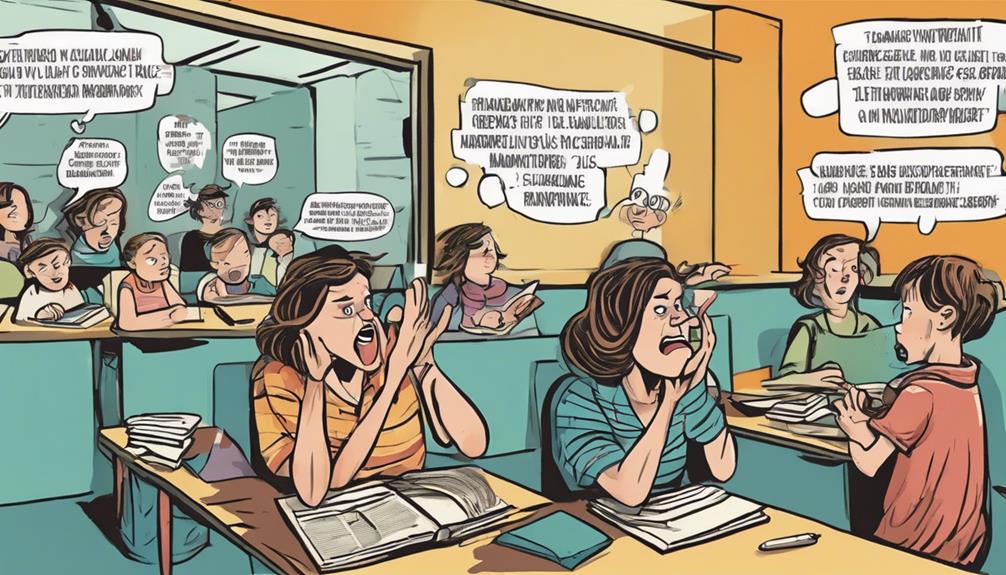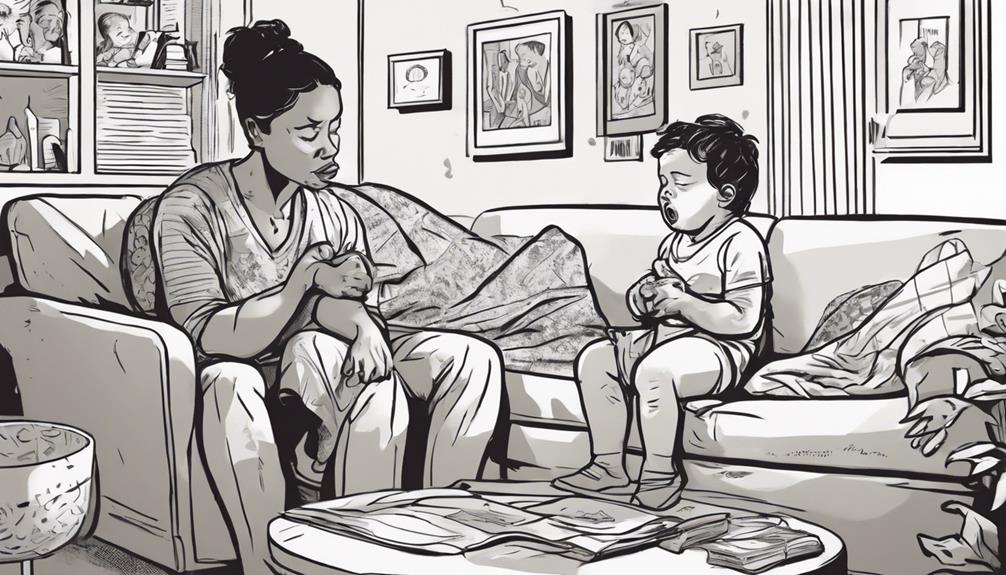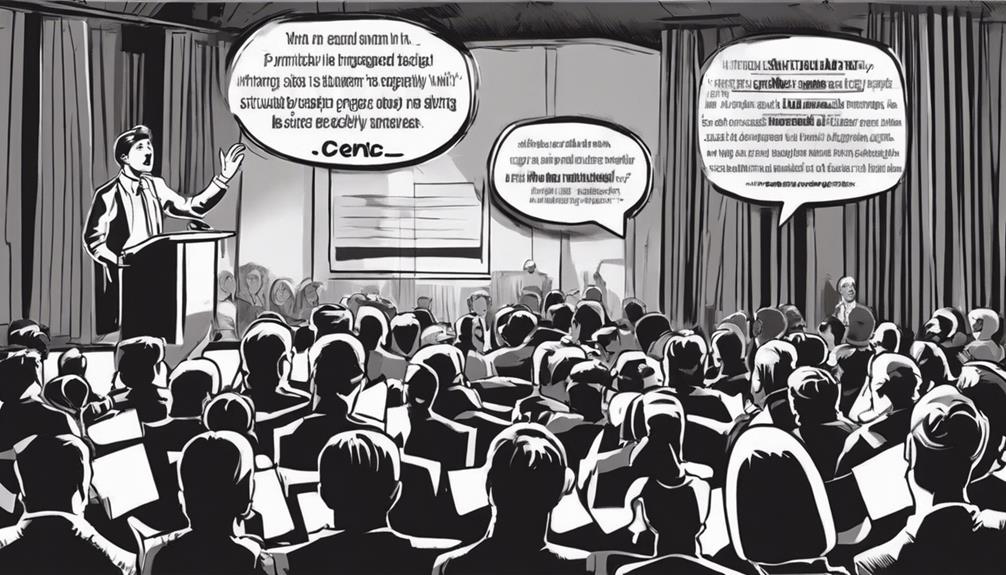Parenting Tips
Mandatory Education: Why Parenting Classes Should Not Be Mandatory
Torn between mandatory parenting classes? Discover why some believe they should remain optional for individual autonomy and diverse parenting styles.

Thinking about **mandatory parenting classes**? Remember, every family stands out. Parents follow different beliefs and methods tied to their culture and values. Forcing these classes might infringe on your right to choose what’s best for your family. **Respecting personal freedom** is key to helping parents feel confident. Understanding various parenting styles is essential for a society that values different approaches. **Stay tuned** to find out why many think parenting classes should be optional.
Key Takeaways
- Respecting diverse parenting styles is crucial.
- Concerns about government overreach and privacy rights.
- Potential infringement on parental autonomy.
- Balancing individual autonomy with mandates.
- Ethical considerations and cultural sensitivity.
Parenting Styles Are Diverse
Parenting styles vary widely due to cultural differences and individual beliefs, making it challenging to impose a one-size-fits-all approach in mandatory parenting classes. Diversity in parenting styles is an important aspect of our society.
Different cultures have unique ways of raising children, influenced by traditions, values, and beliefs. For example, some families may practice authoritative parenting, which involves setting clear rules while being nurturing and responsive. On the other hand, other families might adopt a more permissive approach, giving children more freedom to make decisions.
Understanding these diverse parenting styles is essential in recognizing that there isn't a right or wrong way to raise a child. Each family has its own way of showing love, discipline, and guidance, shaped by their background and experiences.
Embracing this diversity can help create a more inclusive and understanding community where all parenting styles are respected and valued.
Government Overreach Concerns

When discussing mandatory parenting classes, it's important to contemplate the implications for privacy rights and personal responsibility.
Many individuals worry about the potential intrusion into family matters and the government's role in dictating child-rearing practices.
Privacy Rights Implications
Amid the debate over mandatory parenting classes, concerns have been raised about the potential intrusion of government into personal family matters. When it comes to privacy rights implications, mandatory parenting classes can lead to uncomfortable situations for parents. Sharing intimate details with strangers in these mandated classes may not align with everyone's comfort levels. The requirement for mandatory parenting education could encroach on individuals' autonomy and their ability to make decisions about raising their children. This intrusion raises valid concerns about privacy violations that might dissuade some parents from seeking help or support through these mandated classes.
| Privacy Rights Implications |
|---|
| – Potential government overreach into personal family matters |
| – Disclosure of personal parenting practices |
| – Infringement on individuals' autonomy and decision-making |
Personal Responsibility Emphasis
With the focus on personal responsibility, the concern arises about potential government overreach when mandating parenting classes. Parents value their autonomy in making decisions about how to raise their children, believing that personal responsibility should guide their parenting choices, not mandated classes.
When the government mandates parenting classes, some parents may feel that their rights are being infringed upon, leading to concerns about the intrusion into personal family matters.
Empowering parents to make informed choices based on their personal beliefs and values is essential for fostering a supportive and nurturing environment for children. By emphasizing personal responsibility, parents can tailor their parenting approach to suit their family dynamics and individual needs.
Mandatory education may undermine this sense of autonomy, leading to resistance and potentially counterproductive outcomes. It is important to strike a balance between providing resources and support for parents while respecting their right to make decisions in the best interest of their children.
Encouraging personal responsibility in parenting can lead to more positive outcomes than mandatory classes imposed by the government.
Infringement on Parental Rights

When it comes to parenting classes being mandatory, a key concern is the potential infringement on your rights as a parent. These classes might make you feel like your freedom to make decisions for your family is being restricted.
It's crucial to contemplate how mandatory parenting education could impact your autonomy, your ability to make decisions for your children, and your sense of personal responsibility.
Parental Autonomy Rights
Enforcing mandatory parenting classes may encroach upon the autonomy rights of parents, sparking resistance to government intervention in personal child-rearing choices.
Here are some key points to ponder regarding parental autonomy rights:
- Legal Challenges: Parents may feel compelled to challenge the legality of being required to attend parenting classes, citing their right to make decisions for their children.
- Civil Rights Concerns: Mandating parenting classes could raise civil rights issues, as some parents may argue that it violates their freedom to raise their children as they see fit.
- Cultural Variances: Different cultural practices in parenting might clash with standardized guidelines imposed by mandatory classes, leading to conflicts based on individual beliefs and traditions.
- Balancing Rights: The debate on mandatory parenting education centers around finding a balance between respecting parental autonomy rights and ensuring the welfare of children through education and support programs.
Family Decision-Making Freedom
Imposing mandatory parenting classes safeguards parents' rights to make decisions for their families, preserving their autonomy and authority. As a parent, you have the fundamental right to choose the best methods for raising your children.
When the government mandates parenting classes, it can impede your freedom to make decisions that align with your family's values and beliefs. It's essential to respect parental rights in order to maintain trust and cooperation within the family unit.
Having the freedom to decide how to parent allows you to tailor your approach to meet your family's unique needs. By respecting parental autonomy in decision-making, you can foster a healthy and supportive environment for your children to thrive.
Government intervention in parenting can create conflicts and tension, leading to challenges in family dynamics. Upholding parental rights ensures that you can make choices that are in the best interest of your family without external interference.
Personal Responsibility Preservation
Preserving personal responsibility in parenting choices is essential to safeguarding parental rights and autonomy. When it comes to raising your children, here are some key points to keep in mind:
- Parental Rights: As a parent, you have the privilege to make decisions about how to raise your children. Mandatory parenting classes could infringe on these rights by imposing specific methods on you.
- Autonomy: Your independence in parenting is crucial. Being forced to take classes may undermine your ability to make independent decisions about what's best for your family.
- Judgment: Trusting your discernment as a parent is vital. Mandatory classes could suggest that you aren't capable of making informed choices without external guidance.
- Family Dynamics: Upholding personal responsibility in parenting decisions is essential for maintaining harmonious family dynamics. When parents are stripped of their rights to choose how to parent, it can lead to resistance and disrupt the balance within the family unit.
Individual Autonomy Vs. Mandates

Respecting individual autonomy while considering mandates presents a delicate balance in the discourse surrounding parenting classes. As a parent, your right to make decisions about how to raise your child is essential. Mandatory parenting classes can encroach on this autonomy, potentially conflicting with your personal beliefs and preferred parenting style. This infringement may lead to resistance and non-compliance, as parents should have the freedom to choose the methods that align with their values without government intervention.
Every family is unique, with diverse parenting approaches and dynamics. A one-size-fits-all mandatory class requirement may not cater to these individual differences. Striking a balance between honoring parental autonomy and ensuring the well-being of children is a complex ethical consideration in the debate on mandatory parenting classes.
Ethical Considerations in Parenting Classes

Considering ethical implications, mandating parenting classes raises concerns about infringing on individual rights and autonomy. When delving into the domain of parenting education, it's important to navigate these ethical considerations thoughtfully.
Here are some key points to ponder:
- Parental Autonomy: Balancing the state's interest in child welfare with the rights of parents to make decisions about their families is a delicate ethical tightrope.
- Coercion: The use of mandatory parenting classes can be seen as a form of coercion, potentially undermining the voluntary nature of seeking help and support.
- Cultural Sensitivity: Respecting diverse parenting practices and cultural differences is essential when implementing any mandatory education programs to avoid imposing a one-size-fits-all approach.
- Access to Voluntary Resources: Ensuring that parents have access to voluntary resources and support is paramount. Mandatory requirements may limit the effectiveness of these resources and lead to unintended negative consequences.
In exploring the ethical landscape of parenting classes, it's essential to tread carefully, considering the nuances of parental autonomy and coercion to promote a supportive and respectful environment for all families.
Effectiveness of Mandatory Education

Mandatory parenting classes may not effectively cater to individual parenting styles and needs. While these classes aim to provide valuable information and support, they may not always address the diverse backgrounds and unique circumstances of every parent. The one-size-fits-all approach of mandatory education can overlook specific challenges and preferences that parents face in raising their children.
As a result, the effectiveness of these classes in improving parenting outcomes may vary.
Moreover, parents may resist being required to attend these classes, leading to challenges in implementing and enforcing such mandates. Feeling that their rights and autonomy are being infringed upon, some parents may not fully engage with the material presented. Additionally, different cultural backgrounds and beliefs can clash with the content and approach of mandatory classes, further limiting their effectiveness in reaching and supporting all parents.
To truly help parents thrive in their role, a more personalized and voluntary approach to parenting education may be more beneficial.
Support for Struggling Parents

Parenting classes can offer essential support and guidance to struggling parents who are facing challenges in raising their children. Here are four key reasons why mandatory parenting classes can be beneficial for parents in need:
- Skill Development:
These classes aim to equip parents with essential skills and resources to create a positive and nurturing environment for their children. By learning effective parenting techniques, struggling parents can better handle challenging situations.
- Preventing Child Abuse:
Offering mandatory classes for parents in need can help prevent child abuse and promote healthy family dynamics. Education on proper discipline methods and stress management can reduce the likelihood of abusive behaviors.
- Improved Parenting Skills:
Providing education and assistance to struggling parents can lead to enhanced parenting skills and overall well-being for families. Enhanced communication and conflict resolution abilities can strengthen parent-child relationships.
- Securing Child Safety:
Mandatory classes for parents in difficult situations can help secure the well-being and safety of children in vulnerable households. By teaching parents about child development and safety measures, these classes can create a safer environment for children to grow and thrive.
Promoting Positive Parenting Practices

Promoting positive parenting practices involves encouraging parents to actively engage in voluntary education and support programs. By offering parenting classes on a voluntary basis, parents have the opportunity to choose the resources that best suit their needs and family dynamics. This approach fosters a more positive learning environment where parents feel empowered to make informed decisions. Mandatory classes may not address the unique situations of each family, but voluntary participation allows for tailored support.
When parents voluntarily participate in parenting classes, they can learn valuable skills and strategies to enhance their parenting abilities. These programs provide accessible resources that promote positive interactions between parents and children. By choosing to engage in these educational opportunities, parents can strengthen their relationships with their children and create a nurturing environment at home.
Balancing Freedoms for Children's Interests

Striking a balance between personal liberties and societal benefits is important when thinking about the interests of children in the context of parenting education. As we explore this topic, it's crucial to grasp the intricate line that must be navigated to uphold both parental rights and child development.
Here are four key points to ponder:
- Respecting Parental Rights: Parents have the right to make decisions regarding their children's upbringing without unnecessary interference. Mandatory parenting classes could be seen as an infringement on this fundamental right.
- Fostering Child Development: While parental autonomy is important, it's also crucial to prioritize the well-being and development of children. Finding ways to support children's growth and safety without impeding on parental freedoms is a delicate balance to strike.
- Government Overreach Concerns: Compulsory parenting classes raise valid concerns about government intrusion into family matters. It's crucial to weigh the benefits against the potential drawbacks of such mandates.
- Safeguarding Fundamental Freedoms: Advocates for personal autonomy emphasize that parenting decisions should primarily be left to individual discretion. Balancing these freedoms with children's interests poses a significant challenge in the domain of parenting education.
Frequently Asked Questions
Why Should People Not Take Parenting Classes?
You shouldn't avoid parenting classes because they can offer helpful tips and strategies to improve your parenting skills.
While mandatory classes may raise concerns about individual rights and cultural differences, voluntarily participating can be a great way to learn new approaches and connect with other parents facing similar challenges.
Embrace the opportunity to enhance your parenting toolkit and create a supportive community for yourself and your children.
Is It Necessary for Parents to Attend Parenting Classes?
Is it necessary for parents to attend parenting classes?
Well, while attending parenting classes can provide valuable insights and skills to enhance your parenting journey, it's not an absolute must.
You have the freedom to choose how you educate yourself on parenting based on your unique needs and circumstances.
Whether you seek out classes, online resources, or support groups, the key is to be proactive in your quest for knowledge to be the best parent you can be.
Should Parents Take Parenting Classes Before Having a Child Debate?
Before having a child, should parents take parenting classes? It's a hot topic! Some argue that classes can provide valuable skills and insights to help you navigate the challenges of parenting. Others worry about mandatory requirements infringing on personal freedoms. Ultimately, the decision is yours.
Consider the benefits of preparation and the potential impact on your parenting journey. Exploring different perspectives can help you make an informed choice that aligns with your beliefs and values.
Is Necessary for Parents to Attend a Parenting Training Course to Bring Their Children up Do You Agree or Disagree?
Do you really need to attend a parenting training course to raise your children successfully?
While formal classes can offer valuable insights, effective parenting isn't a one-size-fits-all approach.
Many factors influence parenting styles, and mandatory classes may not be the best solution for every parent.
Embracing diverse methods and resources can lead to successful parenting outcomes, showing that there are multiple paths to nurturing and supporting your children.
Should Parenting Classes Be Required for All Parents?
Parenting classes should be required for all parents. Learning the basics of childrearing (parenting 101) can help ensure that all parents are equipped with the necessary skills and knowledge to raise their children effectively. Mandatory classes can provide valuable guidance and support for both new and experienced parents alike.
Conclusion
In the end, while parenting classes can be beneficial for some, forcing all parents to participate may not be the best approach. Remember, every family is unique, and what works for one may not work for another.
So, why not trust parents to make the best decisions for their children? After all, isn't the love and care they provide the most important factor in raising happy and healthy kids?
Parenting Tips
Unleash Your Public Speaking Potential With Confidence
Dive into mastering public speaking with confidence by learning essential techniques to captivate your audience and overcome stage fright.

Boost your public speaking skills by nailing the basics. Know your audience and design a clear speech layout. Tackle stage fright with deep breaths and expressive body language. Handle Q&A sessions calmly and confidently. Use visual aids to make your point stronger. These tips will unlock your public speaking potential and skyrocket your confidence.
Key Takeaways
- Practice speaking in front of a mirror multiple times for confidence.
- Utilize deep breathing and visualization techniques to overcome stage fright.
- Tailor your speech to connect with the audience on a personal level.
- Embrace non-verbal communication through eye contact and confident body language.
- Use clear speech structure with a compelling opening and strong conclusion.
Preparation for Public Speaking
Preparing meticulously for public speaking is essential for delivering a successful and impactful speech. Researching audience demographics, interests, and knowledge levels is vital. Understanding the importance of public speaking for communication skills, confidence, career growth, leadership, and effective idea conveyance is fundamental.
Practice speaking in front of a mirror and rehearse multiple times to build confidence. Creating a clear speech structure and tailoring content to connect on a personal level are key components. By focusing on these preparation steps, speakers can enhance their delivery and captivate their audience effectively.
Mastering Speech Structure

To excel in public speaking, mastering the structure of your speech is paramount for engaging and effectively conveying your message to the audience.
Begin with a compelling opening to grab attention, followed by a clear introduction of the main points. Organize these points logically, supporting them with relevant examples or stories. Guarantee a smooth shift between sections to maintain coherence.
End with a strong conclusion that reinforces your key message and leaves a lasting impact. Practice your speech multiple times to familiarize yourself with the content, tone, pace, and body language.
Embrace non-verbal communication through eye contact, confident posture, and effective gestures. Utilize visual aids sparingly to enhance, not overpower, your message.
Overcoming Stage Fright

Conquering stage fright is an essential aspect of delivering a successful public speech, requiring mastery of self-confidence and effective coping strategies. When facing stage fright, deep breathing exercises and visualization techniques can help calm nerves. It is important to focus on the message, engage the audience, and start with a strong opening. Enhancing presence through confident body language, eye contact, gestures, and voice modulation can also alleviate anxiety. Avoiding fidgeting, speaking clearly, varying pitch, and controlling the pace of speech are key strategies to overcome stage fright. Here is a table summarizing key points:
| Stage Fright Coping Strategies | Examples | Effectiveness |
|---|---|---|
| Deep breathing exercises | Diaphragmatic breathing | Calms nerves |
| Visualization techniques | Imagining a successful speech | Boosts confidence |
| Focus on the message | Engage with the audience | Reduces anxiety |
| Confident body language | Maintaining good posture | Enhances presence |
| Voice modulation | Varying pitch and pace | Controls nervousness |
Handling Q&A Sessions

When moving from delivering a speech to interacting with the audience in a Q&A session, it is important to maintain composure and actively listen to questions being posed.
During Q&A sessions, follow these key strategies:
- Listen Carefully: Pay close attention to each question to provide relevant responses.
- Remain Calm: Stay composed and confident, even if faced with challenging or unexpected queries.
- Engage with Gratitude: Thank the audience for their questions and show appreciation for their participation.
Visual Aids and Message Reinforcement

Utilizing visually appealing aids is pivotal in reinforcing the message delivered during a public speech. Visual aids, such as slides, props, or multimedia presentations, serve to enhance audience understanding and retention of key points.
When incorporating visual elements, it is essential to keep them simple, clear, and complementary to the spoken content. Overloading the audience with visuals can distract from the message, so it's essential to strike a balance that guarantees a memorable speech delivery.
Effective non-verbal cues, gestures, and body language can further reinforce the intended message, creating a cohesive and impactful presentation. Establishing a strong presence on stage through confident posture, eye contact, and appropriate hand movements enhances the overall delivery of the speech.
Frequently Asked Questions
How Can I Effectively Engage a Diverse Audience?
To effectively engage a diverse audience, tailor your content to resonate with their backgrounds and interests. Utilize engaging storytelling, interactive elements, and inclusive language. Encourage participation, listen actively, and adjust your delivery to guarantee everyone feels acknowledged and valued.
What Are Some Strategies to Handle Technical Difficulties During a Presentation?
In the field of public speaking, handling technical glitches demands a calm demeanor, quick thinking, and preparedness. Confirm backup plans for equipment failures, practice with the technology, and maintain composure to troubleshoot effectively.
How Do I Maintain Audience Interest Throughout a Longer Speech?
To maintain audience interest throughout a longer speech, engage them with compelling stories, interactive elements, and relevant examples. Vary your tone, pace, and delivery to keep them attentive. Use visuals sparingly to supplement key points and enhance message retention.
What Are Some Tips for Incorporating Humor Into a Serious Speech?
Incorporate humor strategically by using relevant anecdotes, witty remarks, or light-hearted observations to break tension, engage the audience, and make complex topics more digestible. Balance humor with professionalism to maintain credibility and impact.
How Can I Address Audience Skepticism or Resistance During a Presentation?
To address audience skepticism or resistance during a presentation, employ strategic storytelling, provide credible evidence, acknowledge opposing viewpoints respectfully, and engage in active listening. Build trust by establishing common ground and demonstrating empathy towards differing perspectives for a more receptive audience.
Conclusion
To sum up, mastering the art of public speaking requires careful preparation, confident delivery, and effective message reinforcement. By honing speech structure, overcoming stage fright, and utilizing visual aids strategically, individuals can unlock their full potential as speakers.
Embracing these practices will not only enhance communication skills but also leave a lasting impact on the audience. With dedication and practice, anyone can become a compelling and confident public speaker.
Parenting Tips
Youth Drive Eco-Friendly Revolution Against Plastics
Unleash the power of youth in the fight against plastic pollution by discovering their innovative eco-friendly initiatives and impactful contributions.

The youth are at the forefront of combating single-use plastics, advocating for sustainable alternatives to tackle the pressing issue of plastic pollution. With 14 million tons of plastic entering the oceans annually, urgent action is essential. Despite challenges like lack of awareness and cheap plastic production, promoting eco-friendly practices, such as using reusable items, and supporting local businesses with green initiatives can make a significant impact. Engaging students in environmental efforts not only instills responsibility but also empowers them to lead the eco-friendly revolution. By educating and involving the younger generation, a cleaner and healthier environment can be achieved.
Key Takeaways
- Educate students on plastic alternatives and eco-friendly practices.
- Empower students to advocate for policy changes promoting sustainable initiatives.
- Encourage students to lead by example in reducing plastic consumption.
- Implement green practices within educational settings to inspire eco-friendly habits.
- Foster a sense of responsibility in students to drive the eco-friendly revolution against plastics.
Impact of Single-Use Plastics
Annually, a staggering 14 million tons of plastic find their way into Earth's oceans, highlighting the detrimental impact of single-use plastics on the environment.
Despite campaigns like Keep Britain Tidy, the persistence of single-use plastics poses a significant threat to marine ecosystems. Organizations are actively working towards replacing these plastics with sustainable alternatives to mitigate the environmental damage caused.
The youth, in particular, are affected by the toxic repercussions of plastic pollution. As plastic waste continues to accumulate in oceans, urgent action is required to address this global issue.
It is essential to raise awareness about the consequences of single-use plastics and promote eco-friendly practices to combat this growing environmental challenge.
Challenges in Reducing Plastic Waste

Despite efforts to raise awareness and promote eco-friendly practices, reducing plastic waste globally presents numerous challenges that hinder progress towards a sustainable future. One major challenge is the lack of awareness on plastic waste and its environmental impact.
Disparity in reducing single-use plastics globally also poses a significant obstacle. The cheap production of plastics makes it challenging to phase them out in favor of more sustainable options.
Additionally, the need for widespread eco-friendly practices is essential but often not implemented on a large scale. Education on the effects of pollution caused by plastics is lacking, further complicating efforts to reduce plastic waste effectively. These challenges highlight the complex nature of addressing plastic waste on a global scale.
Promoting Sustainable Practices

One significant approach to addressing the challenges in reducing plastic waste is by promoting sustainable practices that prioritize eco-friendly alternatives and responsible waste management.
By advocating for the use of eco-friendly alternatives to single-use plastics, such as reusable bags and water bottles, individuals can greatly reduce their plastic consumption.
Supporting local businesses that implement eco-friendly initiatives and encouraging schools to adopt sustainable practices are also effective ways to promote a more environmentally conscious lifestyle.
Additionally, promoting important waste management, such as proper recycling and disposal of plastics, plays a vital role in minimizing the environmental impact of plastic waste.
Engaging Students in Environmental Initiatives

Involving students in environmental initiatives is crucial for cultivating a culture of sustainability and fostering a sense of responsibility towards the environment.
By educating students on plastic alternatives and empowering them to demand eco-friendly products, schools can play a significant role in shaping future environmental leaders.
Implementing green practices within educational settings, such as reducing printing waste and promoting sustainable alternatives, helps students understand the importance of environmental conservation.
Through these initiatives, students can learn the value of responsible waste management and contribute to minimizing their ecological footprint.
Leading Eco-Friendly Revolution

Educating and empowering students on eco-friendly practices is fundamental in leading the eco-friendly revolution towards sustainable living. By instilling a sense of responsibility and understanding the impact of their actions, students can become catalysts for change. Here is a table showcasing key strategies to lead the eco-friendly revolution:
| Strategies | Description |
|---|---|
| Implement Green Practices | Schools can adopt sustainable practices like recycling programs and reducing plastic waste. |
| Advocate for Policy Changes | Students can push for policy changes at school and community levels to promote eco-friendly practices. |
| Lead by Example | Embracing sustainable practices, using reusable items, and volunteering to make a positive impact. |
| Educate and Empower | Educating peers, sharing facts, and demanding eco-friendly products to create a culture of environmental responsibility. |
Frequently Asked Questions
How Can Youth Effectively Influence Companies to Prioritize Recyclability?
Youth can effectively influence companies to prioritize recyclability by engaging in advocacy efforts, leveraging social media platforms to raise awareness, collaborating with environmental organizations, and participating in sustainable initiatives to showcase the demand for eco-friendly practices.
What Innovative Ways Can Schools Implement to Reduce Printing Waste?
To reduce printing waste, schools can implement digital platforms for assignments, utilize double-sided printing, encourage electronic submissions, promote paperless communication, establish printing quotas for students, and educate on eco-friendly practices. These innovative methods foster sustainability and cost-efficiency.
Are There Specific Strategies to Empower Students to Demand Eco-Friendly Products?
To empower students to demand eco-friendly products, schools can educate on sustainable options, encourage activism for environmentally responsible choices, collaborate with local businesses promoting green initiatives, and integrate eco-friendly practices into the curriculum.
How Can Local Businesses Be Supported in Implementing Eco-Friendly Initiatives?
Local businesses can be supported in implementing eco-friendly initiatives by providing financial incentives, offering training on sustainable practices, connecting them with eco-conscious suppliers, and promoting their efforts through community partnerships. Collaboration is key for lasting impact.
What Are the Key Steps to Fostering a Culture of Environmental Responsibility in Schools?
Fostering a culture of environmental responsibility in schools involves educating students on eco-friendly practices, empowering them to demand sustainable solutions, implementing green initiatives, reducing waste, and advocating for policy changes at school and community levels.
Conclusion
To sum up, crucially, the youth-led eco-friendly revolution against plastics showcases the power of collective action in combating environmental threats. By promoting sustainable practices, engaging students in initiatives, and leading the charge for change, these young activists are driving a dynamic shift towards a cleaner, greener future.
Their dedication and determination to tackle the challenges posed by plastic waste serve as a shining example of environmental stewardship and responsibility. Let us all join in this essential mission to protect our planet for generations to come.
Parenting Tips
Unleashing Potential: Bruce Lee's Inspirational Lessons
Discover the transformative power of Bruce Lee's teachings and unlock your potential through philosophy, physical training, and strategic thinking.

Bruce Lee’s life lessons push for growth through **philosophy**, exercise, and smart thinking. Conquering challenges, using strengths in conflicts, and building a good work ethic by training the whole body are key. Staying calm and thinking strategically matter. There are efforts to keep his legacy alive with historic spots and filming sites. You can join in through online groups and social media. As a long-time teacher, the author shares cool ideas on growing personally and learning. Check out related info and chat with others for even more knowledge. **Bruce Lee’s lessons inspire.**
Key Takeaways
- Philosophy of hard work and continuous improvement for personal growth.
- Leveraging strength for conflict resolution and strategic responses.
- Training every part of the body for a strong work ethic.
- Preserving Bruce Lee's legacy through historic locations and landmarks.
- Engage with online community for educational insights and inspiration.
Influence on Personal Growth
Bruce Lee's philosophy of physical training and hard work propelled me to conquer personal challenges and embrace a mindset of continuous improvement. His belief in leveraging the enemy's strength to handle conflicts calmly resonated deeply within me.
The emphasis he placed on training every part of the body inspired a strong work ethic that I aim to embody daily. One of the key takeaways from Lee was the ability to remain composed in the face of provocation and respond strategically.
Witnessing how he lived out his teachings emphasized the importance of leading by example, a principle I now hold close to my heart. Bruce Lee's influence continues to shape my approach to personal growth and self-improvement.
Legacy Preservation Efforts

Efforts are underway to secure and preserve historic locations in Pak Chong related to Bruce Lee's legacy. The Big Boss house, an important filming spot, has remained largely unchanged since 1971.
Plans for the refurbishment of Wat Siri Samphan, the temple at the filming site, are in progress. Collaborative initiatives are working diligently to maintain iconic structures for future generations to appreciate.
These preservation endeavors aim to honor Bruce Lee's profound impact on martial arts and cinema. By safeguarding these filming sites and historical landmarks, the legacy of Bruce Lee can be protected and celebrated for years to come.
The commitment to preserving these significant locations showcases the enduring influence and importance of Bruce Lee's contributions to the world of entertainment and martial arts.
Community Engagement Opportunities

Engage with a network of like-minded individuals passionate about preserving historical landmarks by joining the Richard Rogers online community for daily updates on educational content.
Stay connected by following on Twitter and liking the Facebook page.
Engage with like-minded individuals interested in education and Bruce Lee's legacy.
Connect with a network of individuals passionate about preserving historical landmarks.
Opportunities to contribute to initiatives preserving Bruce Lee's impact are available.
Author Background and Expertise

My background includes being a high school science and mathematics teacher with a BSc (Hons) in Molecular Biology from Bangor University. I also hold a PGCE in Secondary Science Education and a Certificate in Mathematics.
Additionally, I'm an award-winning author of 'The Quick Guide to Classroom Management' and have experience in blogging on topics related to education, science, and mathematics teaching. With a strong foundation in both scientific knowledge and pedagogical skills, I aim to provide valuable insights and educational content to readers.
My expertise lies in creating engaging and informative material that resonates with individuals interested in personal growth, education, and the legacy of inspirational figures like Bruce Lee.
Related Content and Interaction

Exploring various articles by Richard James Rogers provides valuable insights on education, personal growth, and the legacy of inspirational figures like Bruce Lee. When investigating related content and interaction, readers can expect the following:
- Read more articles by Richard James Rogers covering education and personal growth topics.
- Gain deeper insights into Bruce Lee, Pak Chong, and 'The Big Boss' movie.
Engage with the author through comments, shares, and likes on blog posts.
- Stay updated on new publications and educational resources.
These interactive opportunities allow readers to explore further into the teachings of Bruce Lee and the impact he's had on personal growth and education.
Frequently Asked Questions
How Can I Incorporate Bruce Lee's Teachings Into My Daily Life?
I incorporate Bruce Lee's teachings into my daily life by applying his philosophy of hard work and using challenges as opportunities for growth. I remain calm, focus on training every aspect, and lead by example.
What Other Historic Landmarks Related to Bruce Lee Are Being Preserved?
Other historic landmarks related to Bruce Lee being preserved include the Big Boss house and Wat Siri Samphan in Pak Chong. Collaborative efforts are underway to maintain these iconic structures and secure his legacy for future generations.
What Types of Educational Content Can I Expect in the Online Community?
In the online community, expect a diverse range of educational content covering topics like personal growth, Bruce Lee's philosophy, historical preservation efforts, and community engagement opportunities. Stay informed, inspired, and connected with like-minded individuals.
Can Richard James Rogers Provide Personalized Teaching Advice?
Yes, I can provide personalized teaching advice. Drawing from my experience as a high school science and mathematics teacher, I offer tailored guidance to support educators in enhancing their classroom management and instructional strategies.
Are There Opportunities for Readers to Contribute Their Own Stories or Insights?
Yes, there are opportunities for readers to contribute their own stories or insights. I encourage sharing personal experiences and insights to foster a collaborative learning environment and enrich our community with diverse perspectives.
Conclusion
To sum up, Bruce Lee's timeless teachings on unlocking potential serve as a beacon of inspiration for individuals seeking personal growth and empowerment.
As the legendary martial artist once said, 'Be like water.' This adage encapsulates the essence of adaptability and resilience, urging us to flow and evolve with life's challenges.
Through embracing Bruce Lee's philosophy, we can tap into our inner strength, overcome obstacles, and aim for greatness in all aspects of life.
-

 Parenting Styles1 week ago
Parenting Styles1 week agoWorst Parenting Style: Impact on Child Development
-

 Parenting Styles1 week ago
Parenting Styles1 week ago2023 Indiana Parenting Time Guidelines Update
-

 Vetted7 days ago
Vetted7 days ago15 Best Books on Step Parenting Every Blended Family Needs to Read
-

 Parenting Tips6 days ago
Parenting Tips6 days agoUnequal Responsibilities: When One Parent Does All the Parenting
-

 Parenting Tips1 week ago
Parenting Tips1 week agoFostering Love: How Much Do You Get Paid for Foster Parenting?
-

 Vetted6 days ago
Vetted6 days ago15 Best Parenting Books of All Time Every Parent Should Read
-

 Vetted18 hours ago
Vetted18 hours ago15 Best Co-Parenting Books Every Parent Should Read for Successful Co-Parenting
-

 Vetted6 days ago
Vetted6 days ago15 Best Books for Gentle Parenting Every Parent Should Read


















